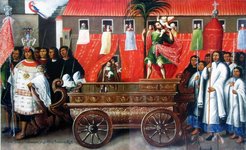Everyday life and canon law: local knowledge of normativity in spanish America
Research Project

Faced with the question of how the processes of adaptation and normative production in religious matters took place throughout the heterogeneous territories of the Spanish empire, we decided to seek answers by observing in detail a selection of particular contexts, actors and spaces. The idea of a canon law with universal pretensions can be understood only by analyzing its contexts of expansion, its need for localization and its concretization in everyday practices. Rather than analyzing unidirectional processes of law application, from a bottom-up legalistic perspective, or restricted to the European sphere, this project seeks to decenter itself from that framework and find new answers by observing everyday dimensions and cultural interactions between diverse actors that translated and produced religious normativities throughout complex intercommunicated colonial spaces.
The practical dimension from the local level allows us to see that, along with a series of mechanisms of concretization (privileges, dispensations, and customary law), there are also many other local particularities and cultural translations of law that show us a decentralized production of normative knowledge. From different remote contexts of the Spanish territories, such as those in Cordoba de Tucuman, Chile, Santa Fe de Bogotá, Michoacán, Cartagena de Indias, the Orinoco river basin and the Philippine archipelago, the project explores diverse ways of thinking, acting and producing knowledge of normativity. Based on the work carried out in the Dictionary DCH, we have held several workshops that have allowed us to establish some transversal lines of analysis on the glocalization of knowledge of religious normativity in Spanish America.
This project is proposed as a publication in the Max Planck Studies in Global Legal History of the Iberian Worlds book series. The volume focuses on three major interrelated areas of analysis: normative knowledge, localizations and agents of concretization. Particularly, it highlights the non-literate knowledge and its particular use of normative literature in peripheries, the moral knowledge useful in situations of uncertainty, and the operational knowledge useful for the performance in the offices. In terms of spatial localizations, the aim is to show not only some special regulations, but also the processes of differentiation and generalization of cultural diversity that take place in glocal dimensions. Last but not least, the book seeks to make visible the active role of litigants, missionaries, parish priests, procurators, translators, and judges, whose daily actions show us forms of legal mobility, circulation of practical normative knowledge and local agencies. This project is part of our effort to promote the historiography of religious normativities facing the early modern Hispanic-American contexts, the diversity of normative sources, and the necessary historiographical dialogue with neighboring perspectives and disciplines.
